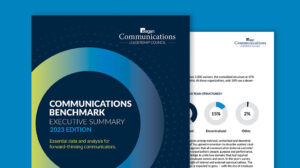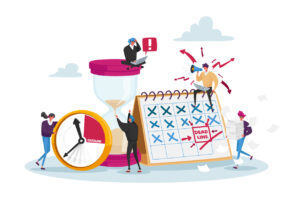10 tips to cultivate happier, healthier habits
Reduce your screen time, up your exercise, and find your ‘ice cream.’

Did you know that happiness makes you more productive?
Research by Oxford University’s Saïd Business School has found that workers are 13% more productive when they’re happy. As a result, this increases engagement and loyalty.
And because happiness is contagious, it can spread throughout your entire organization.
Best of all? There are small, actionable steps we can all take to build healthier, happier habits–and lives.
1. Be who you are, not who you think you should be.
“We live in a world where we are surrounded by ideals, and with a tendency to compare ourselves to others, it’s no wonder so many of us feel like we’re not enough,” Jess Stuart writes for Tiny Buddha.
Stuart continues:
“To find happiness, we must be true to ourselves, live our own dreams, and be proud of what makes us unique. So, instead of comparing yourself to others, look to see if you’re fulfilling your own potential in accordance with what you value.”
Sure, quitting your current job and setting forth on your own might make you happier. But that’s not an option for everyone.
Instead, focus on the small things that encourage you to be yourself. Let’s say that you’re a night owl. You don’t have to force yourself to wake up earlier because that’s what everyone has been hounding you to do. Be true to you.
2. Reduce screen time.
Twelve hours and nine minutes. That’s the average amount of time Americans spent consuming content per day.
Why’s that concerning? Spending too much time on your phone can make you feel anxious or depressed. It can also interfere with your sleep habits.
It can also negatively affect your performance at work. In fact, research has found that reducing screen time at work results in:
- 75% of people believing that they get more done and are more productive.
- 57% stating that they’re motivated to do their best.
- 51% feel more confident.
- 49% reported that they’re happier.
- 44% claim that they deliver higher quality work.
Of course, distancing yourself from your phone or computer is no easy feat. Here are a few painless suggestions to get started:
- Batch your tasks. Specifically when it comes to email and social media. Block out a time in the morning, afternoon and early evening to stay connected . When not doing this, turn off your notifications or download apps that block problematic sites during specific times.
- Establish tech-free zones. Ban electronics from your bedroom, bathroom and wherever you eat.
- Find ways to distract yourself. When you get bored, do something else like a hobby, going for a walk, cleaning, or reading.
- Delate social media apps. Seriously. If you need to use these for branding or networking, login from your computer/laptop, but keep them off your phone.
- Leave your phone behind. When you go for a walk or grocery shopping, don’t take your phone with you. Don’t worry. The world will keep spinning if you disconnect for a few minutes.
3. Send brief messages of thanks.
While limiting your screen time can be beneficial, you can also use this to your advantage. Case in point, practicing gratitude and bolstering relationships.
“Write a two-minute email, or tweet, or Facebook message, or text message praising or thanking one person you know,” says Harvard-trained researcher and Before Happiness author Shawn Achor.
“It’s so simple. Two minutes. It’s usually two or three sentences, and you do a different person for 21 days,” he adds.
Anchor’s research found that doing this for three weeks made senders feel happier. More importantly, they also felt deep social support. “And social support, as I was mentioning, is as predictive of how long we’ll live as obesity, high blood pressure, and smoking,” he shared during an appearance on “Super Soul Sunday.”
“We fight so hard against the negative, and we forget to tell people how powerful a two-minute positive e-mail could be,” Achor says.
But, don’t rule out some old-fashioned communication methods either. “Phone calls are even better,” Achor says. “Even better is face to face, that eye contact.”
And, expressing gratitude through a hand-written improves the well-being of both expressers and recipients. “What we saw is that it only takes a couple of minutes to compose letters like these — thoughtful and sincere ones,” says Amit Kumar, who researched the benefits of handwritten thank-you letters. “It comes at little cost, but the benefits are larger than people expect.”
4. Schedule “stress” time.
Are you feeling anxious or nervous about an upcoming project or the current state of the world? Losing sleep over a deadline or decision you have to make? Stressed out about balancing work and life obligations?
All of these are common and valid concerns. However, it’s wise to find a way to release these feelings. If not, you’re putting your productivity and even overall well-being in peril.
One simple way to achieve this is by scheduling “stress” time. That may sound peculiar, but setting aside a couple of minutes a couple of times each week lets you work through these problems.
Even better? You may even realize that much of what’s stressing you out is either irrational or not in your control. As such, that means you can devote less time and energy to these thoughts.
From my experience, you should do this in the morning. It’s a great prompt to clear your head so that you can focus on your priorities. If you do this before bed, you might have trouble falling asleep since the wheels are spinning.
5. Move for (at least) 11 minutes per day.
Stop making the excuse that you don’t have time for physical activity. A recent study shows that just 11 minutes of moderate exercise can boost your lifespan. Moreover, physical activity is a proven way to lift your mood and jolt your energy.
The simplest activities would be to go for a brisk walk or hop on the treadmill. You could also practice yoga, dance, or do a combo of push-ups, squats, and jogging in place.
6. Don’t be a calendar-default deadbeat.
“Whoever invented the one-hour default in calendar software wasted millions of people-hours,” writes Jeff Haden in an Inc.com article. It’s true. A majority of meetings aren’t productive, and even loathed, because they’re too long.
“Most subjects can be handled in 30 minutes,” adds Haden. What’s more, most “can be handled in 15 minutes–especially if everyone who attends knows the meeting is only going to last 15 minutes.”
“Don’t be a slave to calendar tool defaults,” he advises. “Only schedule an hour if you absolutely know you need it.”
7. Laugh at yourself.
Laughter is often the best medicine. So, if you need a little pick-me-up, try watching a funny video. Or try a little light-hearted self-depreciation.
As noted by NBC News, it’s been found that “those who don’t take themselves too seriously can step back and look at themselves, or mistakes they have made, from an outside perspective.” Moreover, this can protect you from heart disease, better manage pain, and boosts your short-term memory. And, laughing at yourself can make you more resilient and cope with adversity.
As if that weren’t enough, self-mockery can also help you combat stress, foster self-compassion, and reframe challenges. Having a more optimistic outlook can also help you build more positive relationships. And it can cultivate creative thinking and problem-solving skills.
8. Find your “ice cream.”
Perhaps you’ve heard: “Money can’t buy happiness, but it can buy ice cream, and that’s kinda the same thing.”
The idea here is to treat ourselves with small rewards. In fact, studies dealing with SWLS (Satisfied With Life Scale) show that regular small pleasures had more of an impact than a handful of larger ones.
Some suggestions, besides ice cream, would be:
- Hug your dog. Research reveals that being around your dog amps up your levels of oxytocin. And, if you have your four-legged best friend at work, you’ll be less stressed and report more job satisfaction.
- Buy yourself flowers. A study found that this can improve your mood for up to three days.
- Indulge in self-care. Power naps have been found to improve happiness. Another study shows that taking a bath makes us feel rejuvenated and more joyful.
- Enjoy your favorite coffee. Caffeine increases energy levels by blocking the neurotransmitter that causes drowsiness. Coffee also improves brain function and makes us feel less depressed.
- Be generous. Doing something good for others, like donating, is a tried and true way to make you feel happier. Even being a little generous will suffice.
9. Procrastinate productively.
Sometimes, embracing procrastination can be beneficial. Some have claimed that procrastinating has improved their decision-making, provides insights, and sparks creativity.
The catch? It’s all about using this time more efficiently. That means if you can’t get in the zone, don’t mindlessly scroll your social media feeds or YouTube. Instead, do a household chore, squeeze in a quick workout, or read something informative.
10. Don’t force yourself to be happy.
Harvard psychologist and author Susan David argues that forced positive thinking won’t make you automatically happy — it may actually make you unhappy.
So, don’t ignore your emotions or negative feelings. Acknowledge and listen to what they’re telling you. Negative feelings serve a purpose, like sending off a warning sign that you can use to take action.
John Hall is co-founder and president of Calendar. Read more of his work on Calendar’s blog.






